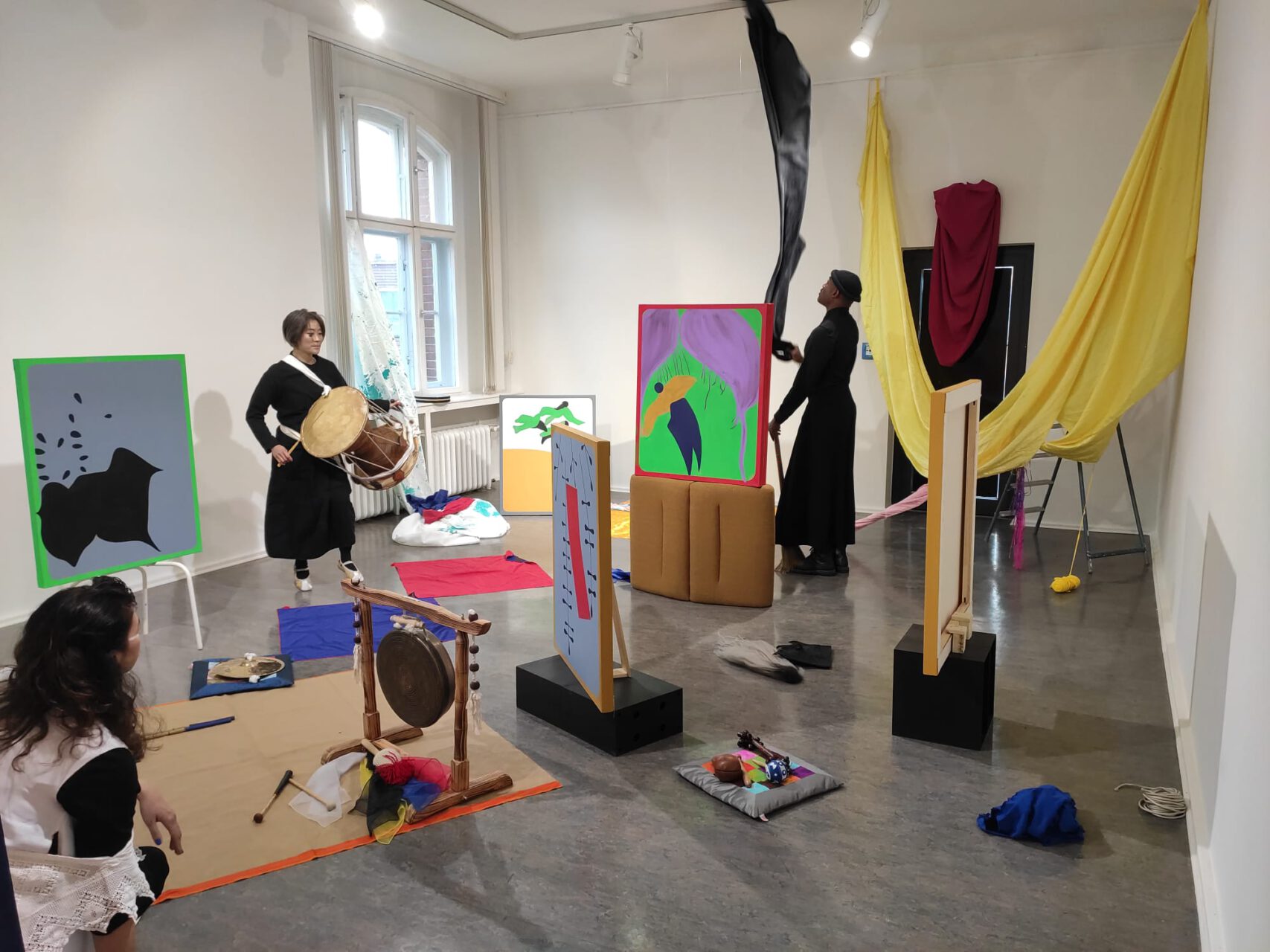The recruitment of Korean nurses, regulated by the recruitment agreement between South Korea and the Federal Republic of Germany, was officially a development aid measure for South Korea. But who was actually helping whom? The Asian/Korean nurses contributed to securing and developing German health care. The “Korea Programme” should therefore rather be understood as reverse development aid for the German health care system.*
Talk and reading with Kook-Nam Cho-Ruwwe, Suza Husse and works by Surya Gied.
28 April 2022, 6pm. In the exhibition Surya Gied: Godori – Kampf der Blumen (Dieter-Ruckhaberle-Förderpreis), curated by Suza Husse.
GalerieETAGE Museum Reinickendorf
Alt-Hermsdorf 35 | 13467 Berlin
Kook-Nam Cho-Ruwwe came to Germany in 1970 as a registered nurse and worked for four decades in various health and care institutions. She is a co-founder of the Korean women’s group in Germany, which emerged in 1978 from the struggle of Korean women against unequal labour and residence rights for Asian migrant workers.
As part of “Godori – Struggle of the Flowers”, there will be a talk with Kook-Nam Cho-Ruwwe, curator Suza Husse and the exhibited works by Surya Gied on 28 April. We will talk with Kook-Nam Cho-Ruwwe about the history(s) of migrant feminist organising and solidarisation in Germany and South Korea. For a discussion of the connections between the crisis of the health system and migration policies or between anti-racist struggles and global decolonial approaches, her reflection on the “development aid” that migrant culture and labour provide is a wonderful starting point. Inspirations for the conversation are therefore also offered by her text “Wer sich nicht bewegt, spürt ihre Fesseln nicht” in the book “Migrantischer Feminismus in der Frauen:Bewegung in Deutschland (1985-2000)” (ed. Encarnación Guitiérrez Rodríguez & Pinar Tuzcu, 2021), from which we will read passages.
In “Godori – Battle of the Flowers”, Surya Gied interweaves cultural and political resonances of the intertwined lifelines and migration stories of her mother and herself. Various traces of historical and contemporary living conditions and struggles of Korean migrant workers in Germany and rice farmers in South Korea are condensed in the exhibition into the collective biography of a house in Hwaho-Ri, a small village in the south of the Korean peninsula. The artist interweaves painterly techniques with oral history, photography, sound and video works, performance and sculpture to create spaces and forms for multidimensional narratives. The exhibition is part of the Dieter Ruckhaberle Award by Künstlerhof Frohnau, which Surya Gied received in 2021. Many of the works presented were created at the Künstlerhof, which is located on the grounds of the former branch of the Karl Bonhoefer Mental Hospital. As Surya Gied’s artistic research revealed, many Korean nurses also worked there until the late 1980s.
Kook-Nam Cho-Ruwwe, born in 1948 in Kimcheon, South Korea, has been actively campaigning for the political-legal, economic and social equality of female migrant workers in Germany and South Korea for more than 40 years. Kook-Nam Cho-Ruwwe is co-founder and chairperson of DaMigra e.V.. She contributes her expertise as a contemporary witness and activist to the various political committees. The promotion of networking and cooperation between migrant women’s organisations as well as dialogues between generations are particularly close to her heart.
Suza Husse works collaboratively and trans*disciplinarily with a focus on queer*feminist and anti-racist cultures of knowledge, political imagination and aesthetics of transformation.
* * Kook-Nam Cho-Ruwwe, Wer sich nicht bewegt, spürt ihre Fesseln nicht, in: Encarnación Guitiérrez Rodríguez & Pinar Tuzcu: Migrantischer Feminismus in der Frauen:Bewegung in Deutschland (1985-2000), 2021, 120.

 Ausstellung "Godori" der Förderpreisträgerin 2021-22 Surya Gied
Ausstellung "Godori" der Förderpreisträgerin 2021-22 Surya Gied